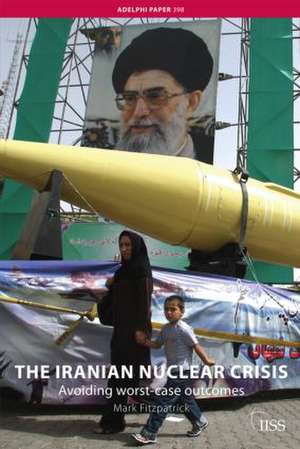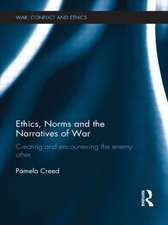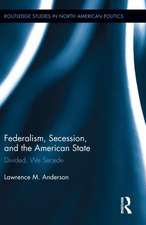The Iranian Nuclear Crisis: Avoiding worst-case outcomes: Adelphi series
Autor Mark Fitzpatricken Limba Engleză Paperback – 30 noi 2008
For nearly two decades, Western strategy on the Iran nuclear issue emphasised denial of supply. Since 2002, there has also been a demand-side dimension to the strategy, aimed at changing Iran’s cost–benefit calculations through inducements and pressure. But the failure of these policies to prevent Iran from coming close to achieving a nuclear-weapons capability has promoted suggestions for fallback strategies that would grant legitimacy to uranium enrichment in Iran in exchange for intrusive inspections and constraints on the programme.
The paper assesses these ‘second-best’ options in terms of their feasibility and their impact on the proliferation risks of diversion of nuclear material and knowledge, clandestine development and NPT break-out, and the risk of stimulating a proliferation cascade in the Middle East and beyond. It concludes that the risks are still best minimised by reinforcing the binary choice presented to Iran of cooperation or isolation, and strengthening denial of supply.
| Toate formatele și edițiile | Preț | Express |
|---|---|---|
| Paperback (1) | 155.39 lei 43-57 zile | |
| Taylor & Francis – 30 noi 2008 | 155.39 lei 43-57 zile | |
| Hardback (1) | 903.38 lei 43-57 zile | |
| Taylor & Francis – 28 iul 2017 | 903.38 lei 43-57 zile |
Din seria Adelphi series
-
 Preț: 199.91 lei
Preț: 199.91 lei -
 Preț: 270.50 lei
Preț: 270.50 lei -
 Preț: 239.46 lei
Preț: 239.46 lei -
 Preț: 183.87 lei
Preț: 183.87 lei -
 Preț: 108.97 lei
Preț: 108.97 lei -
 Preț: 207.85 lei
Preț: 207.85 lei -
 Preț: 109.86 lei
Preț: 109.86 lei -
 Preț: 208.07 lei
Preț: 208.07 lei -
 Preț: 183.74 lei
Preț: 183.74 lei -
 Preț: 183.63 lei
Preț: 183.63 lei -
 Preț: 279.92 lei
Preț: 279.92 lei -
 Preț: 173.96 lei
Preț: 173.96 lei -
 Preț: 131.89 lei
Preț: 131.89 lei -
 Preț: 176.86 lei
Preț: 176.86 lei -
 Preț: 197.68 lei
Preț: 197.68 lei -
 Preț: 221.81 lei
Preț: 221.81 lei - 27%
 Preț: 210.55 lei
Preț: 210.55 lei -
 Preț: 273.21 lei
Preț: 273.21 lei -
 Preț: 299.65 lei
Preț: 299.65 lei -
 Preț: 297.65 lei
Preț: 297.65 lei -
 Preț: 298.80 lei
Preț: 298.80 lei -
 Preț: 307.11 lei
Preț: 307.11 lei -
 Preț: 295.91 lei
Preț: 295.91 lei -
 Preț: 298.39 lei
Preț: 298.39 lei - 26%
 Preț: 229.86 lei
Preț: 229.86 lei -
 Preț: 296.13 lei
Preț: 296.13 lei -
 Preț: 300.50 lei
Preț: 300.50 lei - 20%
 Preț: 131.09 lei
Preț: 131.09 lei -
 Preț: 297.27 lei
Preț: 297.27 lei -
 Preț: 297.11 lei
Preț: 297.11 lei -
 Preț: 296.52 lei
Preț: 296.52 lei -
 Preț: 297.44 lei
Preț: 297.44 lei -
 Preț: 301.31 lei
Preț: 301.31 lei -
 Preț: 295.53 lei
Preț: 295.53 lei - 20%
 Preț: 253.86 lei
Preț: 253.86 lei - 30%
 Preț: 154.79 lei
Preț: 154.79 lei - 31%
 Preț: 141.31 lei
Preț: 141.31 lei - 30%
 Preț: 155.19 lei
Preț: 155.19 lei - 27%
 Preț: 157.00 lei
Preț: 157.00 lei - 28%
 Preț: 166.71 lei
Preț: 166.71 lei -
 Preț: 295.53 lei
Preț: 295.53 lei -
 Preț: 252.88 lei
Preț: 252.88 lei -
 Preț: 297.96 lei
Preț: 297.96 lei - 28%
 Preț: 154.76 lei
Preț: 154.76 lei -
 Preț: 296.68 lei
Preț: 296.68 lei -
 Preț: 272.78 lei
Preț: 272.78 lei -
 Preț: 297.53 lei
Preț: 297.53 lei -
 Preț: 295.75 lei
Preț: 295.75 lei -
 Preț: 311.86 lei
Preț: 311.86 lei -
 Preț: 311.86 lei
Preț: 311.86 lei
Preț: 155.39 lei
Preț vechi: 213.90 lei
-27% Nou
Puncte Express: 233
Preț estimativ în valută:
29.74€ • 32.32$ • 25.00£
29.74€ • 32.32$ • 25.00£
Carte tipărită la comandă
Livrare economică 21 aprilie-05 mai
Preluare comenzi: 021 569.72.76
Specificații
ISBN-13: 9780415466547
ISBN-10: 0415466547
Pagini: 100
Dimensiuni: 156 x 234 x 7 mm
Greutate: 0.19 kg
Ediția:1
Editura: Taylor & Francis
Colecția Routledge
Seria Adelphi series
Locul publicării:Oxford, United Kingdom
ISBN-10: 0415466547
Pagini: 100
Dimensiuni: 156 x 234 x 7 mm
Greutate: 0.19 kg
Ediția:1
Editura: Taylor & Francis
Colecția Routledge
Seria Adelphi series
Locul publicării:Oxford, United Kingdom
Cuprins
Introduction 1. Framing the Problem: Iran,s Pursuit of Fissile Material 2. Western Strategy So Far 3. Can Iran's Capability Be Kept Non-Weaponised? Conclusion
Notă biografică
Mark Fitzpatrick is Senior Fellow for Non-Proliferation at The International Institute for Strategic Studies and Director of its Non-Proliferation and Disarmament Programme. He is the editor and principal author of IISS strategic dossiers on Nuclear Programmes in the Middle East: In the shadow of Iran (London: IISS, 2008) and Nuclear Black Markets: Pakistan, A.Q. Khan and the rise of proliferation networks: A net assessment (London: IISS, 2007). He has published articles on the Iranian and North Korean nuclear programmes and other proliferation topics in Survival, the Financial Times, the International Herald Tribune and other publications, and he is a frequent news commentator and international lecturer on these subjects. He was a US diplomat for 26 years, including as Deputy Assistant Secretary for Non-Proliferation.
Descriere
This paper explains how Iran has developed its nuclear programme to the point where it threatens to achieve a weapons capability within a short time frame, and analyses Western policy responses aimed at forestalling that capability.









